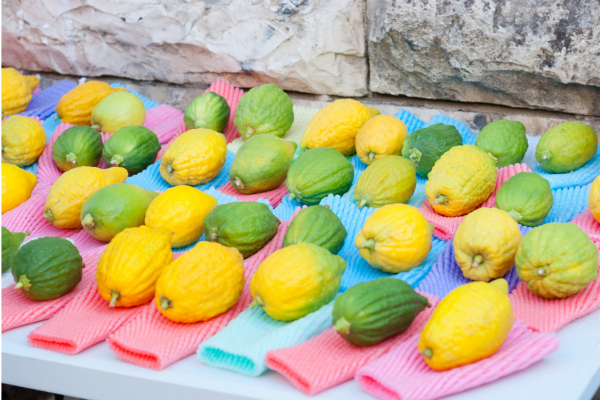![The Tabernacle [Image: Wiki Commons]](https://tibretired.kinsta.cloud/wp-content/uploads/2023/05/Tabernacle-e1454920391720.jpg)
TORAH
NEVI'IM
KETUVIM
Chapter 5
Translation and Transliteration of
Listen to this chapter in Hebrew:
- Commentary
- Buy E-book
- Buy the Israel Bible
1If a person incurs guilt—When he has heard a public imprecation and—although able to testify as one who has either seen or learned of the matter—he does not give information, so that he is subject to punishment;
אוְנֶפֶשׁ כִּי־תֶחֱטָא וְשָׁמְעָה קוֹל אָלָה וְהוּא עֵד אוֹ רָאָה אוֹ יָדָע אִם־לוֹא יַגִּיד וְנָשָׂא עֲוׂנוֹ׃
2Or when a person touches any unclean thing—be it the carcass of an unclean beast or the carcass of unclean cattle or the carcass of an unclean creeping thing—and the fact has escaped him, and then, being unclean, he realizes his guilt;
באוֹ נֶפֶשׁ אֲשֶׁר תִּגַּע בְּכָל־דָּבָר טָמֵא אוֹ בְנִבְלַת חַיָּה טְמֵאָה אוֹ בְּנִבְלַת בְּהֵמָה טְמֵאָה אוֹ בְּנִבְלַת שֶׁרֶץ טָמֵא וְנֶעְלַם מִמֶּנּוּ וְהוּא טָמֵא וְאָשֵׁם׃
3Or when he touches human uncleanness—any such uncleanness whereby one becomes unclean—and, though he has known it, the fact has escaped him, but later he realizes his guilt;
גאוֹ כִי יִגַּע בְּטֻמְאַת אָדָם לְכֹל טֻמְאָתוֹ אֲשֶׁר יִטְמָא בָּהּ וְנֶעְלַם מִמֶּנּוּ וְהוּא יָדַע וְאָשֵׁם׃
4Or when a person utters an oath to bad or good purpose—whatever a man may utter in an oath—and, though he has known it, the fact has escaped him, but later he realizes his guilt in any of these matters—
דאוֹ נֶפֶשׁ כִּי תִשָּׁבַע לְבַטֵּא בִשְׂפָתַיִם לְהָרַע אוֹ לְהֵיטִיב לְכֹל אֲשֶׁר יְבַטֵּא הָאָדָם בִּשְׁבֻעָה וְנֶעְלַם מִמֶּנּוּ וְהוּא־יָדַע וְאָשֵׁם לְאַחַת מֵאֵלֶּה׃
5when he realizes his guilt in any of these matters, he shall confess that wherein he has sinned.
הוְהָיָה כִי־יֶאְשַׁם לְאַחַת מֵאֵלֶּה וְהִתְוַדָּה אֲשֶׁר חָטָא עָלֶיהָ׃
6And he shall bring as his penalty to Hashem, for the sin of which he is guilty, a female from the flock, sheep or goat, as a sin offering; and the Kohen shall make expiation on his behalf for his sin.
ווְהֵבִיא אֶת־אֲשָׁמוֹ לַיהֹוָה עַל חַטָּאתוֹ אֲשֶׁר חָטָא נְקֵבָה מִן־הַצֹּאן כִּשְׂבָּה אוֹ־שְׂעִירַת עִזִּים לְחַטָּאת וְכִפֶּר עָלָיו הַכֹּהֵן מֵחַטָּאתוֹ׃
7But if his means do not suffice for a sheep, he shall bring to Hashem, as his penalty for that of which he is guilty, two turtledoves or two pigeons, one for a sin offering and the other for a burnt offering.
זוְאִם־לֹא תַגִּיע יָדוֹ דֵּי שֶׂה וְהֵבִיא אֶת־אֲשָׁמוֹ אֲשֶׁר חָטָא שְׁתֵּי תֹרִים אוֹ־שְׁנֵי בְנֵי־יוֹנָה לַיהֹוָה אֶחָד לְחַטָּאת וְאֶחָד לְעֹלָה׃
8He shall bring them to the Kohen, who shall offer first the one for the sin offering, pinching its head at the nape without severing it.
חוְהֵבִיא אֹתָם אֶל־הַכֹּהֵן וְהִקְרִיב אֶת־אֲשֶׁר לַחַטָּאת רִאשׁוֹנָה וּמָלַק אֶת־רֹאשׁוֹ מִמּוּל עָרְפּוֹ וְלֹא יַבְדִּיל׃
9He shall sprinkle some of the blood of the sin offering on the side of the mizbayach, and what remains of the blood shall be drained out at the base of the mizbayach; it is a sin offering.
טוְהִזָּה מִדַּם הַחַטָּאת עַל־קִיר הַמִּזְבֵּחַ וְהַנִּשְׁאָר בַּדָּם יִמָּצֵה אֶל־יְסוֹד הַמִּזְבֵּחַ חַטָּאת הוּא׃
10And the second he shall prepare as a burnt offering, according to regulation. Thus the Kohen shall make expiation on his behalf for the sin of which he is guilty, and he shall be forgiven.
יוְאֶת־הַשֵּׁנִי יַעֲשֶׂה עֹלָה כַּמִּשְׁפָּט וְכִפֶּר עָלָיו הַכֹּהֵן מֵחַטָּאתוֹ אֲשֶׁר־חָטָא וְנִסְלַח לוֹ׃
11And if his means do not suffice for two turtledoves or two pigeons, he shall bring as his offering for that of which he is guilty a tenth of an efah of choice flour for a sin offering; he shall not add oil to it or lay frankincense on it, for it is a sin offering.
יאוְאִם־לֹא תַשִּׂיג יָדוֹ לִשְׁתֵּי תֹרִים אוֹ לִשְׁנֵי בְנֵי־יוֹנָה וְהֵבִיא אֶת־קָרְבָּנוֹ אֲשֶׁר חָטָא עֲשִׂירִת הָאֵפָה סֹלֶת לְחַטָּאת לֹא־יָשִׂים עָלֶיהָ שֶׁמֶן וְלֹא־יִתֵּן עָלֶיהָ לְבֹנָה כִּי חַטָּאת הִיא׃
12He shall bring it to the Kohen, and the Kohen shall scoop out of it a handful as a token portion of it and turn it into smoke on the mizbayach, with Hashem's offerings by fire; it is a sin offering.
יבוֶהֱבִיאָהּ אֶל־הַכֹּהֵן וְקָמַץ הַכֹּהֵן מִמֶּנָּה מְלוֹא קֻמְצוֹ אֶת־אַזְכָּרָתָה וְהִקְטִיר הַמִּזְבֵּחָה עַל אִשֵּׁי יְהֹוָה חַטָּאת הִוא׃
13Thus the Kohen shall make expiation on his behalf for whichever of these sins he is guilty, and he shall be forgiven. It shall belong to the Kohen, like the meal offering.
יגוְכִפֶּר עָלָיו הַכֹּהֵן עַל־חַטָּאתוֹ אֲשֶׁר־חָטָא מֵאַחַת מֵאֵלֶּה וְנִסְלַח לוֹ וְהָיְתָה לַכֹּהֵן כַּמִּנְחָה׃
14And Hashem spoke to Moshe, saying:
ידוַיְדַבֵּר יְהֹוָה אֶל־מֹשֶׁה לֵּאמֹר׃
15When a person commits a trespass, being unwittingly remiss about any of Hashem's sacred things, he shall bring as his penalty to Hashem a ram without blemish from the flock, convertible into payment in silver by the sanctuary weight, as a guilt offering.
NE-fesh kee tim-OL MA-al v'-kha-t'-AH bish-ga-GAH mi-kod-SHAY a-do-NAI v'-hay-VEE et a-sha-MO la-do-NAI A-yil ta-MEEM min ha-TZON b'-er-k'-KHA KE-sef sh'-ka-LEEM b'-SHE-kel ha-KO-desh l'-a-SHAM
טונֶפֶשׁ כִּי־תִמְעֹל מַעַל וְחָטְאָה בִּשְׁגָגָה מִקָּדְשֵׁי יְהֹוָה וְהֵבִיא אֶת־אֲשָׁמוֹ לַיהֹוָה אַיִל תָּמִים מִן־הַצֹּאן בְּעֶרְכְּךָ כֶּסֶף־שְׁקָלִים בְּשֶׁקֶל־הַקֹּדֶשׁ לְאָשָׁם׃
5:15 When a person commits a trespass
Chapter five contains a list of sins for which one is required to bring a guilt-offering. Among those listed is the transgression of benefiting from an object belonging to the Beit Hamikdash. This refers to someone who eats or derives other personal gain from food or property that belongs to the Temple, including its wood or stones, or who improperly eats part of a sacrifice. The verse calls this sin ‘a trespass’, an improper use of something holy. We must be careful to honor the sanctity, not only of the Beit Hamikdash, but of the entire Holy Land, and not to misuse any part of it.
16He shall make restitution for that wherein he was remiss about the sacred things, and he shall add a fifth part to it and give it to the Kohen. The Kohen shall make expiation on his behalf with the ram of the guilt offering, and he shall be forgiven.
טזוְאֵת אֲשֶׁר חָטָא מִן־הַקֹּדֶשׁ יְשַׁלֵּם וְאֶת־חֲמִישִׁתוֹ יוֹסֵף עָלָיו וְנָתַן אֹתוֹ לַכֹּהֵן וְהַכֹּהֵן יְכַפֵּר עָלָיו בְּאֵיל הָאָשָׁם וְנִסְלַח לוֹ׃
17And when a person, without knowing it, sins in regard to any of Hashem's commandments about things not to be done, and then realizes his guilt, he shall be subject to punishment.
יזוְאִם־נֶפֶשׁ כִּי תֶחֱטָא וְעָשְׂתָה אַחַת מִכָּל־מִצְוׂת יְהֹוָה אֲשֶׁר לֹא תֵעָשֶׂינָה וְלֹא־יָדַע וְאָשֵׁם וְנָשָׂא עֲוׂנוֹ׃
18He shall bring to the Kohen a ram without blemish from the flock, or the equivalent, as a guilt offering. The Kohen shall make expiation on his behalf for the error that he committed unwittingly, and he shall be forgiven.
יחוְהֵבִיא אַיִל תָּמִים מִן־הַצֹּאן בְּעֶרְכְּךָ לְאָשָׁם אֶל־הַכֹּהֵן וְכִפֶּר עָלָיו הַכֹּהֵן עַל שִׁגְגָתוֹ אֲשֶׁר־שָׁגָג וְהוּא לֹא־יָדַע וְנִסְלַח לוֹ׃
19It is a guilt offering; he has incurred guilt before Hashem.
יטאָשָׁם הוּא אָשֹׁם אָשַׁם לַיהֹוָה׃
20Hashem spoke to Moshe, saying:
כוַיְדַבֵּר יְהֹוָה אֶל־מֹשֶׁה לֵּאמֹר׃
21When a person sins and commits a trespass against Hashem by dealing deceitfully with his fellow in the matter of a deposit or a pledge, or through robbery, or by defrauding his fellow,
כאנֶפֶשׁ כִּי תֶחֱטָא וּמָעֲלָה מַעַל בַּיהֹוָה וְכִחֵשׁ בַּעֲמִיתוֹ בְּפִקָּדוֹן אוֹ־בִתְשׂוּמֶת יָד אוֹ בְגָזֵל אוֹ עָשַׁק אֶת־עֲמִיתוֹ׃
22or by finding something lost and lying about it; if he swears falsely regarding any one of the various things that one may do and sin thereby
כבאוֹ־מָצָא אֲבֵדָה וְכִחֶשׁ בָּהּ וְנִשְׁבַּע עַל־שָׁקֶר עַל־אַחַת מִכֹּל אֲשֶׁר־יַעֲשֶׂה הָאָדָם לַחֲטֹא בָהֵנָּה׃
23when one has thus sinned and, realizing his guilt, would restore that which he got through robbery or fraud, or the deposit that was entrusted to him, or the lost thing that he found,
כגוְהָיָה כִּי־יֶחֱטָא וְאָשֵׁם וְהֵשִׁיב אֶת־הַגְּזֵלָה אֲשֶׁר גָּזָל אוֹ אֶת־הָעֹשֶׁק אֲשֶׁר עָשָׁק אוֹ אֶת־הַפִּקָּדוֹן אֲשֶׁר הָפְקַד אִתּוֹ אוֹ אֶת־הָאֲבֵדָה אֲשֶׁר מָצָא׃
24or anything else about which he swore falsely, he shall repay the principal amount and add a fifth part to it. He shall pay it to its owner when he realizes his guilt.
כדאוֹ מִכֹּל אֲשֶׁר־יִשָּׁבַע עָלָיו לַשֶּׁקֶר וְשִׁלַּם אֹתוֹ בְּרֹאשׁוֹ וַחֲמִשִׁתָיו יֹסֵף עָלָיו לַאֲשֶׁר הוּא לוֹ יִתְּנֶנּוּ בְּיוֹם אַשְׁמָתוֹ׃
25Then he shall bring to the Kohen, as his penalty to Hashem, a ram without blemish from the flock, or the equivalent, as a guilt offering.
כהוְאֶת־אֲשָׁמוֹ יָבִיא לַיהֹוָה אַיִל תָּמִים מִן־הַצֹּאן בְּעֶרְכְּךָ לְאָשָׁם אֶל־הַכֹּהֵן׃
26The Kohen shall make expiation on his behalf before Hashem, and he shall be forgiven for whatever he may have done to draw blame thereby.
כווְכִפֶּר עָלָיו הַכֹּהֵן לִפְנֵי יְהֹוָה וְנִסְלַח לוֹ עַל־אַחַת מִכֹּל אֲשֶׁר־יַעֲשֶׂה לְאַשְׁמָה בָהּ׃






![The Tabernacle [Image: Wiki Commons]](https://tibretired.kinsta.cloud/wp-content/uploads/2016/03/Tabernacle.jpg)


